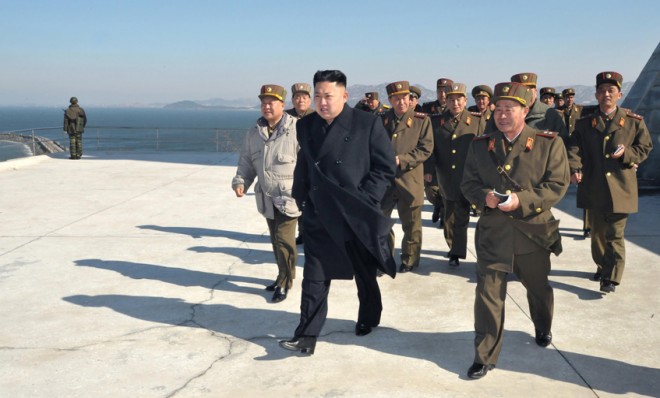Timeline: North Korea's escalating aggression
Tensions rise as Kim Jong Un steps up his threats against South Korea and the U.S.

A free daily email with the biggest news stories of the day – and the best features from TheWeek.com
You are now subscribed
Your newsletter sign-up was successful
North Korea has never shied away from bellicose rhetoric. Lately, however, its young leader Kim Jong Un has taken Pyongyang's threats to a new level, causing the United States and South Korea to flex their military muscle. The U.S. in March sent two nuclear-capable B-2 stealth bombers on a test run over the Korean Peninsula, and has announced that it will send an advanced anti-missile defense system to Guam. Here, a look at how we got to this point:
October 9, 2006
North Korea conducts its first nuclear test with a plutonium-based device. The blast measures less than a kiloton, about a 10th of the size of the atomic bomb dropped on Hiroshima during World War II.
The Week
Escape your echo chamber. Get the facts behind the news, plus analysis from multiple perspectives.

Sign up for The Week's Free Newsletters
From our morning news briefing to a weekly Good News Newsletter, get the best of The Week delivered directly to your inbox.
From our morning news briefing to a weekly Good News Newsletter, get the best of The Week delivered directly to your inbox.
May 25, 2009
North Korea claims it successfully tested a nuclear weapon as strong as the one in Hiroshima. President Obama says the country is "directly and recklessly challenging the international community," and the United Nations passes sanctions banning all weapons exports from North Korea.
December 29, 2011
Kim Jong Un is officially declared supreme leader of North Korea several weeks after the death of his father, Kim Jong Il.
A free daily email with the biggest news stories of the day – and the best features from TheWeek.com
December 11, 2012
North Korea catches the U.S. off guard by successfully launching a Galaxy-3 rocket into orbit. The rocket makes it all the way to the Philippine Sea, unlike a previous attempt in April that disintegrated seconds after launch.
February 12, 2013
Pyongyang conducts its third and most powerful nuclear test. North Korea claims it detonated a "smaller and light" bomb, causing outsiders to worry that the country might be closer to fitting a nuclear warhead atop a ballistic missile.
March 7, 2013
The U.N. Security Council passes its strongest sanctions against North Korea yet, banning all countries from financial transactions that could help fund Pyongyang's nuclear program. Earlier that day, in anticipation of the vote, Pyongyang asserted its "right to preemptive nuclear attack" against the U.S.
March 11, 2013
North Korea nullifies the armistice with South Korea that brought the Korean War's hostilities to an end in 1953.
March 21, 2013
North Korea says it will attack U.S. military bases in Japan and Guam if provoked, following joint military exercises by the U.S. and South Korea involving B-52 bombers.
March 27, 2013
North Korea cuts the last remaining lines of communication across the Demilitarized Zone (DMZ) dividing the peninsula. "Under the situation where a war may break out any moment, there is no need to keep North-South military communications," North Korea explained in a statement.
March 28, 2013
Washington announces that two nuclear-capable B-2 stealth bombers dropped inert munitions over a South Korean island to demonstrate "the United States' ability to conduct long-range, precision strikes quickly and at will."
March 30, 2013
North Korea declares a "state of war" with South Korea.
April 2, 2013
Pyongyang announces its plans to restart its Yongbyon nuclear complex, shut down in 2007 during disarmament talks. North Korea claims it is only trying to ease the country's electricity shortage. but the move is condemned by Washington and the U.N.
April 3, 2013
Washington deploys an anti-missile defense system to Guam in response to North Korean threats. In the North Korean town of Kaesong, South Korean workers are banned from entering a jointly run industrial park, which serves as an important trade zone between the two countries.
April 4, 2013
South Korea confirms that Pyongyang moved missiles with "considerable range" to North Korea's east coast, but says it doesn't look like the country is preparing for a "full-scale conflict."
Sources: AP, BBC, CBS News, Christian Science Monitor, Economist, Fox News, The Guardian (2)(3), NBC News, New York Times (2), Reuters (2)(3), Wall Street Journal, Washington Post, Voice of America
Keith Wagstaff is a staff writer at TheWeek.com covering politics and current events. He has previously written for such publications as TIME, Details, VICE, and the Village Voice.
-
 How the FCC’s ‘equal time’ rule works
How the FCC’s ‘equal time’ rule worksIn the Spotlight The law is at the heart of the Colbert-CBS conflict
-
 What is the endgame in the DHS shutdown?
What is the endgame in the DHS shutdown?Today’s Big Question Democrats want to rein in ICE’s immigration crackdown
-
 ‘Poor time management isn’t just an inconvenience’
‘Poor time management isn’t just an inconvenience’Instant Opinion Opinion, comment and editorials of the day